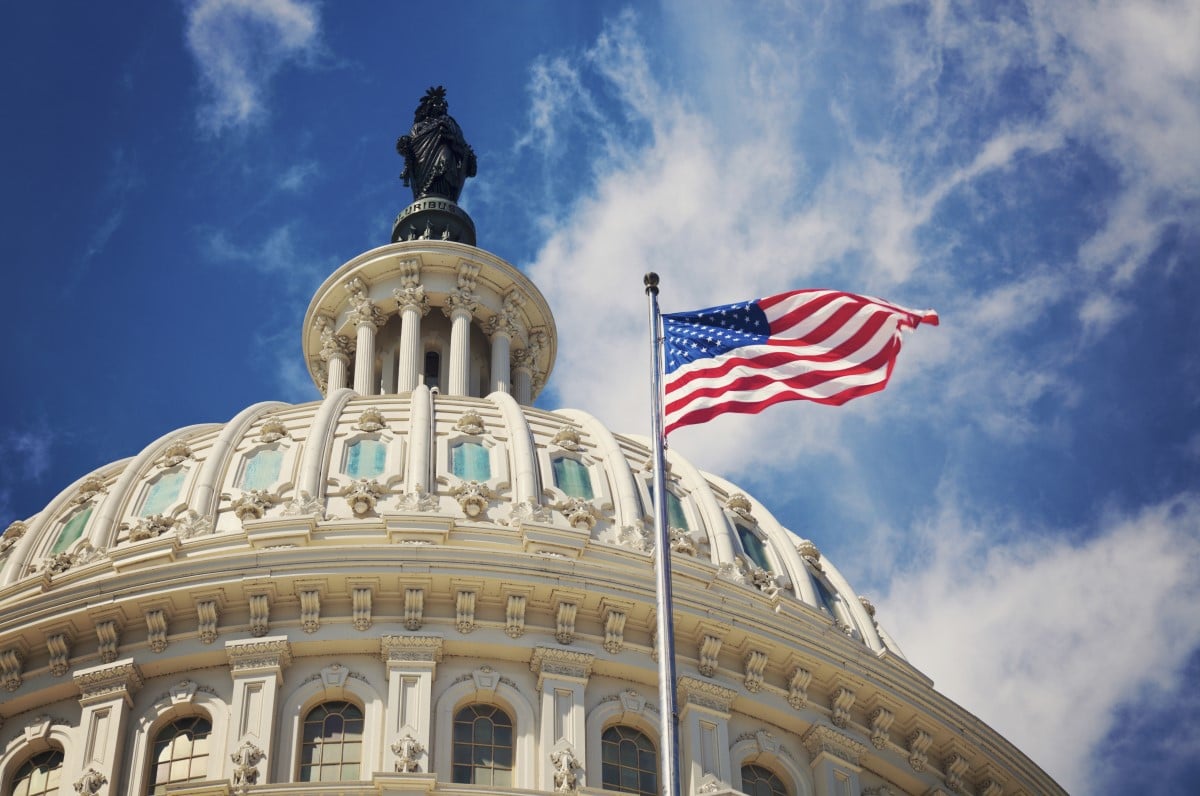As the legislative slate is wiped clean for the 118th Congress, grassroots support becomes even more vital to achieving MOAA’s advocacy objectives.
MOAA needs your help to keep momentum for existing priorities such as the Major Richard Star Act, which would benefit tens of thousands of combat-injured veterans and had the support of two-thirds of Congress at the end of last session. We also need your work on behalf of new objectives and emergent issues, often via immediate action to keep up with the stop-and-go pace of legislation. To keep connected, ensure you are signed up for The MOAA Newsletter and register as an advocate at our Legislative Action Center.
Here is a look at MOAA’s priorities, in support of the 50th anniversary of our all-volunteer force and to address the challenges facing our uniformed community. Note: Our advocacy team remains active on many other issues not listed here; our priorities will be shaped throughout the year depending on concurrent successes or emerging issues that warrant an all-hands approach. Additionally, we share many interests with The Military Coalition and other stakeholder groups, and leverage those relationships to expand our reach on Capitol Hill.
- Compensation and Service-Earned Benefits
- Military Housing
- Health Care for Currently Serving and Retirees
- Health Care and Benefits for Veterans
- Service Families
- Survivors
- Guard and Reserve
Compensation and Service-Earned Benefits
Problems: The ongoing recruiting crisis and unit level personnel shortages create a “do more with less” Personnel “Perfect Storm” for the force and further erode the quality of life for servicemembers and their families. DoD is in a war for talent and is struggling to recruit the force we need to defend our country.
Compensation and quality of life remain relevant to our nation’s recruiting challenges. Servicemembers deserve compensation competitive with the private sector. Congress has allowed the White House to shortchange troops in the past, leading to a 2.6% pay raise gap – something we cannot allow to happen again as servicemembers struggle to make ends meet.
Funding the government on time and strictly keeping to the congressional schedule seems to be a bridge too far for both parties and both chambers. This could lead to a federal shutdown, which would hit Coast Guard, U.S. Public Health Service, and NOAA servicemembers hard since their pay is not guaranteed like those in DoD. We need to fix this: All eight of our services continue to work when the government shuts down, and our servicemembers deserve to be paid for their service.
MOAA also continues to advocate against offsets for some disabled retirees and veterans. Existing legislation places an unfair tax on retired pay to fund a servicemember’s own disability.
Actions:
- Ensure pay at or above the Employment Cost Index, and ensure all allowances and programs necessary to recruit and retain a quality force.
- Ensure pay continues for all eight uniformed services during a government shutdown.
- Provide for concurrent receipt of military retirement pay from DoD and disability pay from the VA.
Military Housing
Problems: The Basic Allowance for Housing (BAH) is designed to cover 95% of housing costs, a steady drop from 100% that took place between 2015 and 2019. This left military families to cover anywhere from $100 to $184 out of pocket each month. With rising housing costs – both for rental properties and home sales – an estimated 75% of military families are paying over $200 out of pocket each month, according to a Blue Star Families survey. BAH should be restored to 100%, the BAH calculation methods should be revised to keep pace with rapid changes in the market, and the housing profiles used in the calculation should be reviewed to reflect current military demographics.
The Military Privatized Housing Initiative was a gamble by Congress and DoD to leverage private dollars to quickly build on-installation housing after years of neglect and deferred maintenance in appropriations. Although the speed of the construction was an initial success, the public-private partnership failed to ensure servicemembers and their families were provided safe and adequate housing. As problems emerged, commanders learned they were left with ineffective tools and questionable authorities to address housing complaints from servicemembers. Mold, pests, and other unsafe conditions in privatized military housing persist.
The Tenant Bill of Rights, an initiative adopted by most privatized housing companies, is not widely known nor enforced. Many families were forced to turn to the media after their chain of command was unable to fix their housing problems. The initiative resulted in partnerships with landlords and investors that require agreement by all parties to implement changes. The nature of the partnership undermines the chain of command, resulting in the loss of trust in leadership. Accountability was not designed into the process, leading to unsafe and inadequate housing.
Actions:
- Restore BAH at 100% of researched housing costs per Military Housing Area.
- Ensure barracks are safe and healthy places to live, verified by the chain of command and government-owned work centers.
- Codify procedures and authorities to increase out-of-cycle housing allowances to address emergencies such as reduced availability of housing and rising utility costs.
Health Care for Currently Serving and Retirees
Problems: The military health care benefit is at risk. TRICARE beneficiaries are paying more for prescription drugs while the value of the TRICARE Pharmacy Program has been slashed via a growing list of non-covered drugs, more restrictive prior-authorization policies that are out of step with best practices, and a 25% reduction to the retail pharmacy network. These cuts disproportionately impact the elderly and those with chronic medical conditions, making it more difficult and costly to adhere to medication regimens.
Military health system (MHS) reforms directed by Congress have resulted in higher fees and copays, particularly for working-age retirees, yet TRICARE coverage polices have failed to keep up with evolving policies, technologies, and treatment protocols. Beneficiaries are paying more for TRICARE coverage that is years behind commercial plan benchmarks.
The direct care system of military hospitals and clinics has undergone a massive reorganization accompanied by changing policies at the military treatment facility (MTF) level and capacity reductions due to the MHS Genesis electronic health record implementation – yet there is minimal visibility on impacts to patient access, quality of care, and the patient experience. Access to care metrics have disappeared from MTF websites, and patients lack a consistent and effective problem-reporting mechanism which would allow their challenges to be tracked and addressed.
Actions:
- Reverse cuts to the pharmacy benefit and establish policy guardrails to ensure access to prescription medications and limits on copay increases.
- Fix the TRICARE Young Adult parity issue by extending eligibility to dependents up to age 26 with no separate premium to bring TRICARE on par with requirements for commercial health plans.
- Require DoD to establish a transparent and well-publicized problem reporting system for beneficiaries experiencing MTF access challenges, including an annual report to Congress on the number and types of beneficiary access problem reports by MTF and steps taken by the Defense Health Agency to identify and address systemic access problems.
Health Care and Benefits for Veterans
Problems: Passing the comprehensive toxic exposure reform bill, the Sergeant First Class Heath Robinson Honoring Our Promise to Address Comprehensive Toxics (PACT) Act was a monumental victory. Now comes the hard part of ensuring it works as Congress intended.
Veterans rely on long-term and home- and community-based care services for everything from occasional help around the house to around-the clock assistance. The VA delivers 14 different types of long term care (LTC) programs in both institutional settings (like community living centers or nursing homes) and non-institutional settings (like a veteran’s home or through community adult day care services called HCBC). Purchasing or providing the care is placing increased demand on the department’s health care system.
The VA has designated 2023 as “The Year of the Caregiver.” The department will focus on continuing to implement the expansion of caregiver support in the MISSION Act, conducting an overall program review, and making systemwide improvements, to include cases being appealed through the Veterans Health Administration and Veterans Benefits Administration.
Additionally, a strong VA workforce and facility infrastructure are critical components to VA’s long-term success. The aging infrastructure and high level of vacancies put the success of bills like the PACT Act and caregiver programs at risk.
MOAA is committed to working with the VA, Congress, and stakeholder groups to monitor and assist the department in meeting the needs of veterans, caregivers, families, and survivors, and ensuring full implementation of major legislation enacted in recent years to modernize the VA across the enterprise.
Actions:
- Monitor recent major legislation enacted such as the PACT Act in the areas of health care, compensation, and follow-on support for surviving spouses and families, and seek statutory or policy changes as required.
- Compel Congress and the VA to accelerate caregiving and whole health care services, and modernization of Veterans Health Administration workforce and facility infrastructure to improve veterans access to high quality care.
Service Families
Problems: Spouses struggle with employment across the board and are constantly fighting to find and maintain employment through PCS moves. The unemployment rate among active duty spouses has hovered between 22% and 24% for over a decade. Efforts to address this issue have focused primarily on providing educational and professional development opportunities for military spouses; however, the other side of the coin is incentivizing businesses to hire someone who will likely move in two or three years. A multipronged approach is necessary to address the high unemployment rate.
Additionally, spouse underemployment continues to negatively impact military families. Ensuring companies define work as both remote AND portable is necessary to allow military spouses to keep a career on the move and progress within their career path. A recent survey of servicemembers showed 39% of respondents cited concerns with spouse employment as a reason for leaving service.
Compounding this issue is the lack of accessible, affordable child care. In 2020, DoD reported nearly 9,000 military children were on waiting lists for child care. The nationwide shortage of child care providers, combined with a lack of investment in renovating and constructing military child development centers, has exacerbated this issue in the post-pandemic environment.
DoD has instituted unique programs such as the In-Home Child Care Fee Assistance to address this issue, but despite 250 spots available for this program, just 23 families were receiving the fee assistance as of late 2022. This is due to a lack of understanding of program requirements and slow application processing times. Standardizing child care programs across the services is necessary to ensure families have clear guidance on the support available.
Day care challenges are a contributing factor to food insecurity in our ranks. In September 2022, DoD released a report on the military and food insecurity, stating 24% of servicemembers and/or their families had experienced some level of food insecurity within the timeframe studied. The implementation of the Basic Needs Allowance (BNA), an allowance designed to provide monthly financial assistance to families falling below 130% of the federal poverty guideline based on income and family size, is a start. Unfortunately, the law establishing the BNA allows DoD leadership to determine which military housing areas will include BAH in the eligibility calculation. The FY 2023 NDAA increased the threshold to 150% of the federal poverty guideline, but MOAA continues to advocate for exclusion of BAH in all housing areas to ensure maximum reach.
Actions:
- Improve congressional support for uniformed services families: Enhance programs to support spouse employment, ensure implementation of an effective basic needs allowance, and provide accessible, affordable child care options.
- Overcome the lack of effective problem-reporting mechanisms and resolution systems in the Military Health System.
Survivors
Problems: When a retired servicemember passes, the Defense Finance and Accounting Service recoups their last month of retirement pay. This is frequently a terrible surprise for a new survivor and adds unnecessary financial stress to a grieving widow. Oftentimes, survivors have their checking account cleared out due to the recoupment and are put under extreme financial duress in the wake of their servicemember’s passing.
This is far from the only financial hurdle faced by survivors. Servicemembers’ Group Life Insurance (SGLI) and Veterans’ Group Life Insurance (VGLI) have not kept up with inflation; although the maximum coverage recently increased from $400,000 to $500,000, it is still more than $100,000 behind where it should be.
Dependency and Indemnity Compensation (DIC) also has fallen behind the levels of other federal survivor programs. DIC is 43% of the compensation of a 100% disabled veteran, compared with 55% of other federal programs.
Actions:
- Repeal the recoupment of last month’s paycheck after retiree’s passing.
- Continue to improve SGLI/VGLI updates to match inflation.
- Improve DIC baseline to align with other government entitlements’ baseline of 55%.
Guard and Reserve
Problems: The reserve component is facing a recruiting crisis. Our nation relies upon these servicemembers to respond to disasters at home and remain in the rotation to deploy worldwide in support of the active component. Members of the National Guard and Reserve must sustain their readiness, and medical care is required to keep the force deployable and support recruiting and retention.
Reserve component retirees also wait excessively long to receive their first paychecks. After a career of service, retirees deserve prompt payments. DFAS and service personnel divisions must stop the finger-pointing and seek to fix this problem.
Actions:
- Overcome the lack of TRICARE coverage for the reserve component to maintain readiness.
- Overcome delayed pay for Guard and Reserve members when they are promoted or when they retire.
- Continue to support Guard and Reserve leaders, and advance legislative and policy solutions to support the total force.
More Members Mean More Influence Over Retirement Pay, Health Care, and Family Programs
Get involved and make sure your interests are addressed. Because the larger our voice is, the greater our impact will be.


